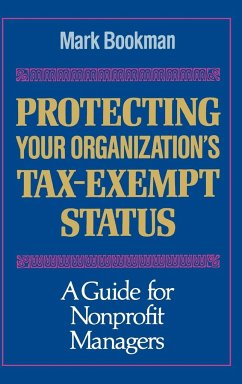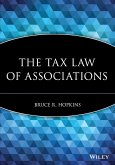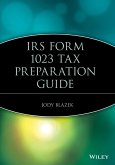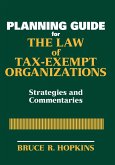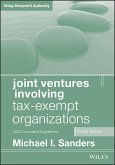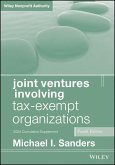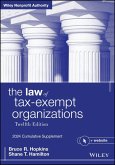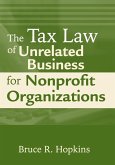- Gebundenes Buch
- Merkliste
- Auf die Merkliste
- Bewerten Bewerten
- Teilen
- Produkt teilen
- Produkterinnerung
- Produkterinnerung
Mark Bookman provides nonprofit leaders with a comprehensive examination of federal, state, and local laws affecting nonprofit organizations, and recommends actions they can take to protect their organization's tax-exempt status. Using case studies extensively, the author explains such crucial matters as preparing for an IRS audit, reporting unrelated business income, responding to claims of unfair competition, and fighting challenges to nonprofits' property tax exemptions. Protecting Your Organization's Tax-Exempt Status demonstrates how federal tax law applies to specific segments of the…mehr
Andere Kunden interessierten sich auch für
![The Tax Law of Associations The Tax Law of Associations]() Bruce R HopkinsThe Tax Law of Associations87,99 €
Bruce R HopkinsThe Tax Law of Associations87,99 €![IRS Form 1023 Tax Preparation Guide IRS Form 1023 Tax Preparation Guide]() Jody BlazekIRS Form 1023 Tax Preparation Guide74,99 €
Jody BlazekIRS Form 1023 Tax Preparation Guide74,99 €![Planning Guide for the Law of Tax-Exempt Organizations Planning Guide for the Law of Tax-Exempt Organizations]() Bruce R HopkinsPlanning Guide for the Law of Tax-Exempt Organizations85,99 €
Bruce R HopkinsPlanning Guide for the Law of Tax-Exempt Organizations85,99 €![Joint Ventures Involving Tax-Exempt Organizations, 2023 Supplement Joint Ventures Involving Tax-Exempt Organizations, 2023 Supplement]() Michael I SandersJoint Ventures Involving Tax-Exempt Organizations, 2023 Supplement156,99 €
Michael I SandersJoint Ventures Involving Tax-Exempt Organizations, 2023 Supplement156,99 €![Joint Ventures Involving Tax-Exempt Organizations, 2024 Supplement Joint Ventures Involving Tax-Exempt Organizations, 2024 Supplement]() Michael I SandersJoint Ventures Involving Tax-Exempt Organizations, 2024 Supplement156,99 €
Michael I SandersJoint Ventures Involving Tax-Exempt Organizations, 2024 Supplement156,99 €![The Law of Tax-Exempt Organizations The Law of Tax-Exempt Organizations]() Bruce R HopkinsThe Law of Tax-Exempt Organizations201,99 €
Bruce R HopkinsThe Law of Tax-Exempt Organizations201,99 €![The Tax Law of Unrelated Business for Nonprofit Organizations The Tax Law of Unrelated Business for Nonprofit Organizations]() Bruce R HopkinsThe Tax Law of Unrelated Business for Nonprofit Organizations92,99 €
Bruce R HopkinsThe Tax Law of Unrelated Business for Nonprofit Organizations92,99 €-
-
-
Mark Bookman provides nonprofit leaders with a comprehensive examination of federal, state, and local laws affecting nonprofit organizations, and recommends actions they can take to protect their organization's tax-exempt status. Using case studies extensively, the author explains such crucial matters as preparing for an IRS audit, reporting unrelated business income, responding to claims of unfair competition, and fighting challenges to nonprofits' property tax exemptions. Protecting Your Organization's Tax-Exempt Status demonstrates how federal tax law applies to specific segments of the nonprofit sector, discusses actual IRS audits of nonprofits, provides examples of how nonprofits have made their case for property tax exemption, shows how nonprofits can develop positive community relations, and reviews congressional hearings on federal tax exemptions for nonprofits.
Hinweis: Dieser Artikel kann nur an eine deutsche Lieferadresse ausgeliefert werden.
Hinweis: Dieser Artikel kann nur an eine deutsche Lieferadresse ausgeliefert werden.
Produktdetails
- Produktdetails
- Verlag: Wiley
- Seitenzahl: 296
- Erscheinungstermin: 16. April 1992
- Englisch
- Abmessung: 235mm x 157mm x 22mm
- Gewicht: 636g
- ISBN-13: 9781555424329
- ISBN-10: 1555424325
- Artikelnr.: 22541521
- Herstellerkennzeichnung
- Libri GmbH
- Europaallee 1
- 36244 Bad Hersfeld
- gpsr@libri.de
- Verlag: Wiley
- Seitenzahl: 296
- Erscheinungstermin: 16. April 1992
- Englisch
- Abmessung: 235mm x 157mm x 22mm
- Gewicht: 636g
- ISBN-13: 9781555424329
- ISBN-10: 1555424325
- Artikelnr.: 22541521
- Herstellerkennzeichnung
- Libri GmbH
- Europaallee 1
- 36244 Bad Hersfeld
- gpsr@libri.de
Mark Bookman is the author of Protecting Your Organization's Tax-Exempt Status: A Guide for Nonprofit Managers, published by Wiley.
Preface
The Author
Tax Exemption Under Challenge: The Context
The Current Debate Over Tax Exemption 3
The Current Environment and Debate 3
The Views of the Protagonists 7
The Current Approach to Tax Laws 9
The Evolution of Government Policy Toward Nonprofit Organizations 12
A Brief History of Federal Law and Tax-Exempt Status 12
The Rationale for Tax Exemption 16
Organizations That Are Covered 20
The Unrelated Business Income Tax 23
Federal Law and the Internal Revenue Code
Federal Law on Tax-Exempt Status and Unrelated Business Income 29
Gaining Tax-Exempt Status 30
Maintaining Tax-Exempt Status 36
Unrelated Business Income 38
Separating Taxable and Nontaxable Income 41
Using the Fragmentation Test 54
Taxing Passive Income 54
Convenience Exception 59
Political Activity 60
Other Exemptions 62
Special Rules for Specific Types of Income 64
Leasing Rules 65
Debt-Financed Property 67
Income from Advertising 69
Subsidiary Organizations 71
Exploitation Rule 74
Joint Ventures and Partnerships 74
Dual Use Facilities 76
Fund-Raising Activities and Solicitations 77
Mailing Lists 78
Research 79
How the Internal Revenue Code Treats Different Types of Organizations 81
Educational Organizations 82
Religious Organizations 85
Hospitals 87
Other Major Categories of Organizations 95
Potential Changes to the Internal Revenue Code 98
Posthearing Activity: Proposals Currently Under Consideration 100
Actions of the Internal Revenue Service 107
Other Tax Legislation 110
State and Local Issues
Nonprofit Tax Law at the State Level 115
The Unfair Competition Debate 115
The Business Coalition for Fair Competition 116
Legislative Activity at the State Level 120
Review Commissions 124
Proposed Model State Unfair Competition Bill 125
Judicial Activity and Other State Legislation 126
The Use of Political Pressure 130
Responses in the Nonprofit Community: Policy Formulation 134
The Future 137
Local Government and Property Tax Exemptions 139
Property Tax Exemption Litigation 141
Litigation: Exemption from Other Local Government Taxes 146
Property Tax Exemption Statutes 146
Community and Nonprofit Organization Relationships: Political Alternatives
152
Options Other Than Property Tax Exemptions: State Subsidies 154
Options Other Than Property Tax Exemptions: Fees in Lieu of Taxes 155
Judicially Created Multipart Tests and Other Court Actions 157
Overview of Property Tax Exemption 159
Community Disputes Over Property Tax Exemptions: Lessons from Specific
Cases 161
Higher Education 162
Case Study: The Syracuse University Carrier Dome 165
Case Study: The YMCA 168
Case Study: Voluntary Hospitals 176
Guidelines for Action
Ensuring Compliance with the Law and Dealing with Potential Challenges 187
What the Law Requires 187
Developing and Implementing an Action Plan 190
The Audit Process 195
A Recommended Proactive Program: The Social Accountability Budget 200
Other Proactive Examples 207
Applicability to Individual Organizations 212
Influencing Public Policy Toward Nonprofits 213
Resource A. Unrelated Business Income Tax Cases 221
Resource B. Unfair Competition Cases 230
Resource C. Property Tax and Related Cases 232
Resource D. Internal Revenue Service Materials 239
References 247
Index 259
The Author
Tax Exemption Under Challenge: The Context
The Current Debate Over Tax Exemption 3
The Current Environment and Debate 3
The Views of the Protagonists 7
The Current Approach to Tax Laws 9
The Evolution of Government Policy Toward Nonprofit Organizations 12
A Brief History of Federal Law and Tax-Exempt Status 12
The Rationale for Tax Exemption 16
Organizations That Are Covered 20
The Unrelated Business Income Tax 23
Federal Law and the Internal Revenue Code
Federal Law on Tax-Exempt Status and Unrelated Business Income 29
Gaining Tax-Exempt Status 30
Maintaining Tax-Exempt Status 36
Unrelated Business Income 38
Separating Taxable and Nontaxable Income 41
Using the Fragmentation Test 54
Taxing Passive Income 54
Convenience Exception 59
Political Activity 60
Other Exemptions 62
Special Rules for Specific Types of Income 64
Leasing Rules 65
Debt-Financed Property 67
Income from Advertising 69
Subsidiary Organizations 71
Exploitation Rule 74
Joint Ventures and Partnerships 74
Dual Use Facilities 76
Fund-Raising Activities and Solicitations 77
Mailing Lists 78
Research 79
How the Internal Revenue Code Treats Different Types of Organizations 81
Educational Organizations 82
Religious Organizations 85
Hospitals 87
Other Major Categories of Organizations 95
Potential Changes to the Internal Revenue Code 98
Posthearing Activity: Proposals Currently Under Consideration 100
Actions of the Internal Revenue Service 107
Other Tax Legislation 110
State and Local Issues
Nonprofit Tax Law at the State Level 115
The Unfair Competition Debate 115
The Business Coalition for Fair Competition 116
Legislative Activity at the State Level 120
Review Commissions 124
Proposed Model State Unfair Competition Bill 125
Judicial Activity and Other State Legislation 126
The Use of Political Pressure 130
Responses in the Nonprofit Community: Policy Formulation 134
The Future 137
Local Government and Property Tax Exemptions 139
Property Tax Exemption Litigation 141
Litigation: Exemption from Other Local Government Taxes 146
Property Tax Exemption Statutes 146
Community and Nonprofit Organization Relationships: Political Alternatives
152
Options Other Than Property Tax Exemptions: State Subsidies 154
Options Other Than Property Tax Exemptions: Fees in Lieu of Taxes 155
Judicially Created Multipart Tests and Other Court Actions 157
Overview of Property Tax Exemption 159
Community Disputes Over Property Tax Exemptions: Lessons from Specific
Cases 161
Higher Education 162
Case Study: The Syracuse University Carrier Dome 165
Case Study: The YMCA 168
Case Study: Voluntary Hospitals 176
Guidelines for Action
Ensuring Compliance with the Law and Dealing with Potential Challenges 187
What the Law Requires 187
Developing and Implementing an Action Plan 190
The Audit Process 195
A Recommended Proactive Program: The Social Accountability Budget 200
Other Proactive Examples 207
Applicability to Individual Organizations 212
Influencing Public Policy Toward Nonprofits 213
Resource A. Unrelated Business Income Tax Cases 221
Resource B. Unfair Competition Cases 230
Resource C. Property Tax and Related Cases 232
Resource D. Internal Revenue Service Materials 239
References 247
Index 259
Preface
The Author
Tax Exemption Under Challenge: The Context
The Current Debate Over Tax Exemption 3
The Current Environment and Debate 3
The Views of the Protagonists 7
The Current Approach to Tax Laws 9
The Evolution of Government Policy Toward Nonprofit Organizations 12
A Brief History of Federal Law and Tax-Exempt Status 12
The Rationale for Tax Exemption 16
Organizations That Are Covered 20
The Unrelated Business Income Tax 23
Federal Law and the Internal Revenue Code
Federal Law on Tax-Exempt Status and Unrelated Business Income 29
Gaining Tax-Exempt Status 30
Maintaining Tax-Exempt Status 36
Unrelated Business Income 38
Separating Taxable and Nontaxable Income 41
Using the Fragmentation Test 54
Taxing Passive Income 54
Convenience Exception 59
Political Activity 60
Other Exemptions 62
Special Rules for Specific Types of Income 64
Leasing Rules 65
Debt-Financed Property 67
Income from Advertising 69
Subsidiary Organizations 71
Exploitation Rule 74
Joint Ventures and Partnerships 74
Dual Use Facilities 76
Fund-Raising Activities and Solicitations 77
Mailing Lists 78
Research 79
How the Internal Revenue Code Treats Different Types of Organizations 81
Educational Organizations 82
Religious Organizations 85
Hospitals 87
Other Major Categories of Organizations 95
Potential Changes to the Internal Revenue Code 98
Posthearing Activity: Proposals Currently Under Consideration 100
Actions of the Internal Revenue Service 107
Other Tax Legislation 110
State and Local Issues
Nonprofit Tax Law at the State Level 115
The Unfair Competition Debate 115
The Business Coalition for Fair Competition 116
Legislative Activity at the State Level 120
Review Commissions 124
Proposed Model State Unfair Competition Bill 125
Judicial Activity and Other State Legislation 126
The Use of Political Pressure 130
Responses in the Nonprofit Community: Policy Formulation 134
The Future 137
Local Government and Property Tax Exemptions 139
Property Tax Exemption Litigation 141
Litigation: Exemption from Other Local Government Taxes 146
Property Tax Exemption Statutes 146
Community and Nonprofit Organization Relationships: Political Alternatives
152
Options Other Than Property Tax Exemptions: State Subsidies 154
Options Other Than Property Tax Exemptions: Fees in Lieu of Taxes 155
Judicially Created Multipart Tests and Other Court Actions 157
Overview of Property Tax Exemption 159
Community Disputes Over Property Tax Exemptions: Lessons from Specific
Cases 161
Higher Education 162
Case Study: The Syracuse University Carrier Dome 165
Case Study: The YMCA 168
Case Study: Voluntary Hospitals 176
Guidelines for Action
Ensuring Compliance with the Law and Dealing with Potential Challenges 187
What the Law Requires 187
Developing and Implementing an Action Plan 190
The Audit Process 195
A Recommended Proactive Program: The Social Accountability Budget 200
Other Proactive Examples 207
Applicability to Individual Organizations 212
Influencing Public Policy Toward Nonprofits 213
Resource A. Unrelated Business Income Tax Cases 221
Resource B. Unfair Competition Cases 230
Resource C. Property Tax and Related Cases 232
Resource D. Internal Revenue Service Materials 239
References 247
Index 259
The Author
Tax Exemption Under Challenge: The Context
The Current Debate Over Tax Exemption 3
The Current Environment and Debate 3
The Views of the Protagonists 7
The Current Approach to Tax Laws 9
The Evolution of Government Policy Toward Nonprofit Organizations 12
A Brief History of Federal Law and Tax-Exempt Status 12
The Rationale for Tax Exemption 16
Organizations That Are Covered 20
The Unrelated Business Income Tax 23
Federal Law and the Internal Revenue Code
Federal Law on Tax-Exempt Status and Unrelated Business Income 29
Gaining Tax-Exempt Status 30
Maintaining Tax-Exempt Status 36
Unrelated Business Income 38
Separating Taxable and Nontaxable Income 41
Using the Fragmentation Test 54
Taxing Passive Income 54
Convenience Exception 59
Political Activity 60
Other Exemptions 62
Special Rules for Specific Types of Income 64
Leasing Rules 65
Debt-Financed Property 67
Income from Advertising 69
Subsidiary Organizations 71
Exploitation Rule 74
Joint Ventures and Partnerships 74
Dual Use Facilities 76
Fund-Raising Activities and Solicitations 77
Mailing Lists 78
Research 79
How the Internal Revenue Code Treats Different Types of Organizations 81
Educational Organizations 82
Religious Organizations 85
Hospitals 87
Other Major Categories of Organizations 95
Potential Changes to the Internal Revenue Code 98
Posthearing Activity: Proposals Currently Under Consideration 100
Actions of the Internal Revenue Service 107
Other Tax Legislation 110
State and Local Issues
Nonprofit Tax Law at the State Level 115
The Unfair Competition Debate 115
The Business Coalition for Fair Competition 116
Legislative Activity at the State Level 120
Review Commissions 124
Proposed Model State Unfair Competition Bill 125
Judicial Activity and Other State Legislation 126
The Use of Political Pressure 130
Responses in the Nonprofit Community: Policy Formulation 134
The Future 137
Local Government and Property Tax Exemptions 139
Property Tax Exemption Litigation 141
Litigation: Exemption from Other Local Government Taxes 146
Property Tax Exemption Statutes 146
Community and Nonprofit Organization Relationships: Political Alternatives
152
Options Other Than Property Tax Exemptions: State Subsidies 154
Options Other Than Property Tax Exemptions: Fees in Lieu of Taxes 155
Judicially Created Multipart Tests and Other Court Actions 157
Overview of Property Tax Exemption 159
Community Disputes Over Property Tax Exemptions: Lessons from Specific
Cases 161
Higher Education 162
Case Study: The Syracuse University Carrier Dome 165
Case Study: The YMCA 168
Case Study: Voluntary Hospitals 176
Guidelines for Action
Ensuring Compliance with the Law and Dealing with Potential Challenges 187
What the Law Requires 187
Developing and Implementing an Action Plan 190
The Audit Process 195
A Recommended Proactive Program: The Social Accountability Budget 200
Other Proactive Examples 207
Applicability to Individual Organizations 212
Influencing Public Policy Toward Nonprofits 213
Resource A. Unrelated Business Income Tax Cases 221
Resource B. Unfair Competition Cases 230
Resource C. Property Tax and Related Cases 232
Resource D. Internal Revenue Service Materials 239
References 247
Index 259

